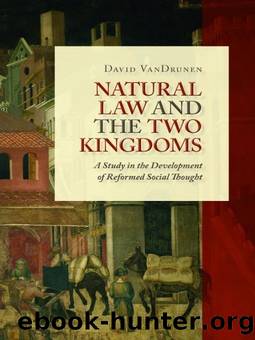Natural Law and the Two Kingdoms: A Study in the Development of Reformed Social Thought (Emory University Studies in Law and Religion (Eerdmans)) by David VanDrunen

Author:David VanDrunen [VanDrunen, David]
Language: eng
Format: mobi
Publisher: Eerdmans Publishing Co - A
Published: 2010-04-14T16:00:00+00:00
Conclusion
Abraham Kuyper’s theological vision of cultural and political life is arguably the most thorough and complex ever constructed in the history of Reformed Christianity. In this chapter I have attempted to explicate important aspects of this vision as they pertain to the development of the Reformed traditions of natural law and the two kingdoms. My conclusion, as perhaps befits the subject matter, is itself somewhat complex. I have argued that Kuyper, contrary to what is often taken to be characteristically “Kuyperian,” in fact laid a great deal of theological foundation that placed him squarely and comfortably in the Reformed natural law and two kingdoms traditions, particularly through his doctrines of the divine ordinances and common grace. He not only affirmed many traditional Reformed categories but also developed these in constructive ways, often paralleling the developments of the American Presbyterians considered in Chapter 6. But I have also claimed that Kuyper, in both his practical political rhetoric and his theological handling of matters such as the Christianization of culture and Christ’s two mediatorships, acted and reasoned in ways that are in tension with his traditional Reformed foundations.
My claim that theological coherence militates against the co-existence of both of these aspects of Kuyper’s thought and therefore demands the choosing of one rather than the other seems to be borne out by subsequent Reformed reflection on cultural and political matters. Both Karl Barth and the ongoing development of neo-Calvinism have rejected a traditional Reformed two kingdoms theological foundation and pursued various visions of a Christian culture. Kuyper may have grounded cultural endeavors in the creation order, but he did so ambiguously. Much subsequent thought in Reformed circles has resolved the ambiguity in ways unfriendly to this traditional creation order approach. Thus it now lies for the next two chapters to unravel the decisive turn in Reformed social thought accomplished by Barth and the neo-Calvinists.
Download
This site does not store any files on its server. We only index and link to content provided by other sites. Please contact the content providers to delete copyright contents if any and email us, we'll remove relevant links or contents immediately.
| Africa | Americas |
| Arctic & Antarctica | Asia |
| Australia & Oceania | Europe |
| Middle East | Russia |
| United States | World |
| Ancient Civilizations | Military |
| Historical Study & Educational Resources |
German, Jew, Muslim, Gay by Marc David Baer(998)
Letters to a Young Contrarian by Christopher Hitchens(962)
American Prophets by Jack Jenkins(848)
Unholy by Sarah Posner(725)
Shapiro, Ben - The Right Side of History by Shapiro Ben(694)
M31 by Stephen Wright(660)
The End of Empathy by John W. Compton(640)
Sacred Causes by Michael Burleigh(610)
Jihad & Co. - Black Markets and Islamist Power by Aisha Ahmad(595)
ERADICATE - Blotting Out God in America by Fiorazo David(555)
The Theft of America's Soul by Phil Robertson(554)
Atheist Universe by David Mills(553)
Sacred Liberty by Steven Waldman(529)
The Family by Sharlet Jeff(517)
The Jefferson Bible - Life And Morals Of Jesus Of Nazareth by Thomas Jefferson(500)
Religion and Power by Martin David(493)
C Street by Jeff Sharlet(491)
Beyond Terror: Islam's Slow Erosion of Western Democracy by Anne Marie Waters(489)
Doing Theology in the Age of Trump: A Critical Report on Christian Nationalism (Westar Seminar on God and the Human Future Book 0) by Robbins Jeffrey W(482)
